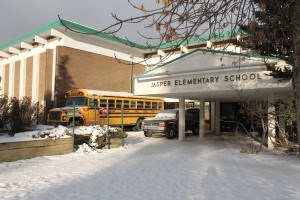
Since the introduction of French immersion at Jasper Elementary School (JES) in 2002, enrolment has been steadily growing.
According to Grande Yellowhead Public School Division’s (GYPSD) year-end report, which was released earlier this month, 121 students enrolled in the elementary’ school’s French immersion program in 2015, opposed to 96 students in the English-only program. The year before there were 128 immersion students while 96 opted for the English-stream.
“To see this in Jasper is really positive because it shows we have this linguistic duality that works really well. It’s so positive to see that even if parents don’t come from a French background that they want to give their children the ability to speak two languages,” said Geneviève Arcand, regional director of Jasper’s Association Canadienne-Française de l’Alberta (ACFA).
Jasperites aren’t the only ones keen to brush up on a second language. Across the country, immersion enrolment has climbed 40 per cent over the past decade, with Alberta up 12 per cent, according to the most recent figures obtained by the Canadian Parents for French, a non-profit group.
For Jasperite Christine Oeggerli, enrolling her three children in the French immersion program was a no-brainer.
“I can’t teach it to them myself because I don’t speak French, but we live in a bilingual country so if they have that opportunity then I would like them to experience that because I think it will only benefit them in the future,” she said. “Starting young is how you have to do it because for them it’s just normal—that’s what they think school is.”
The only problem Oeggerli said she has with the program is as her kids progress she is unable to help them with homework. However, Arcand said for parents in the same situation, the ACFA is there to help.
“A lot of people in town think that the ACFA is only for the francophone school, but we’re here for francophone culture and for immersion,”Arcand said. “We want to be involved in the community so if parents and children need more activities or support to learn about French then we are there for that.”
For Jasper Junior/Senior High School (JJSHS) teacher Leslie Currie, she said she’s testing the French waters with her daughter Lucy, who is in Grade 2 at JES.
“Lucy is bright and we want to challenge her in school, but if it becomes too challenging or she doesn’t enjoy it or we notice a lapse in her English skills then we’ll pull her out,” she said, adding that as a teacher she’s witnessed pros and cons with immersion.
“I’ve seen it from the other side and sometimes we have immersion students who have trouble with English spelling or things like that.
“If I came from a French background then I would push it, but for my kids it has to make sense for them.”
Currie also has a younger son, who isn’t in school yet. She is still undecided if she will enrol him in the immersion program.
Currie isn’t alone in her willingness to drop the program. In the same year-end report, GYPSD noted a decrease of immersion students at the junior high and senior high school levels. In 2015, JJSHS had 96 immersion students compared to 129 English-only students. The year before had similar numbers with 88 immersion students and 133 of the latter.
Jasper’s francophone school, École Desrochers—Kindergarten to Grade 12—has also been steadily growing, according to Hélène Gendron, the school’s principal.
“Since our move into our new building, we have enjoyed steady growth. We are delighted that almost all francophone children in Jasper have decided to attend the francophone school,” she said. “It is our vision to provide a quality francophone education in order to ensure that the francophone identity continues from one generation to the next.”
École Desrochers currently has 66 students.
Kayla Byrne
[email protected]
